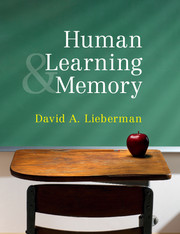Book contents
- Frontmatter
- Contents
- Figures
- Acknowledgments
- Introduction
- Part I Learning
- 1 Some basic assumptions
- 2 Classical conditioning
- 3 Conditioning principles and theories
- 4 Reinforcement
- 5 Reinforcement applications
- 6 Punishment
- 7 Theories of reinforcement
- Part II Memory
- Part III Learning and memory
- Glossary
- References
- Index
6 - Punishment
from Part I - Learning
- Frontmatter
- Contents
- Figures
- Acknowledgments
- Introduction
- Part I Learning
- 1 Some basic assumptions
- 2 Classical conditioning
- 3 Conditioning principles and theories
- 4 Reinforcement
- 5 Reinforcement applications
- 6 Punishment
- 7 Theories of reinforcement
- Part II Memory
- Part III Learning and memory
- Glossary
- References
- Index
Summary
Of several responses made to the same situation…those which are accompanied or closely followed by discomfort to the animal will, other things being equal, have their connection with the situation weakened, so that, when it recurs, they will be less likely to occur.
(Thorndike, 1911, p. 244)We are gradually discovering – at an untold cost in human suffering – that in the long run punishment doesn't reduce the probability that an act will occur.
(Skinner, 1948a)Punishment is one of society's oldest techniques for controlling behavior, and also one of its most controversial. Does it really work? If we spank a child for disobeying an order or send an adult to prison for stealing, will the treatment really be effective? Or are we only building up a reservoir of hostility and bitterness that will lead to even more antisocial behavior in the future?
- Type
- Chapter
- Information
- Learning and Memory , pp. 210 - 240Publisher: Cambridge University PressPrint publication year: 2011



